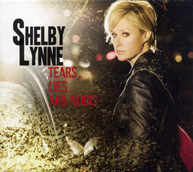
Shelby Lynne
Tears, Lies, And Alibis
(Everso)
A nice amount of enthusiasm on the part of the critics, and a fine commercial
performance when it comes to sales, Just A Little Lovin’ – the artistically
successful album featuring personal versions of songs once performed by
Dusty Springfield that was released two years ago – seemed to promise smooth
sailing for Shelby Lynne’s recording career. It has to be said that the
commercial performance of said album, though adequate, had not been of
the Top Ten kind, but in cases like this the commercial climate so prevalent
nowadays makes redefining one’s expectations mandatory. Me, I was quite
certain that the fine commercial performance of an album featuring covers
would make it possible for Shelby Lynne to release one featuring only her
own songs, which had been (temporarily) put aside, being regarded as something
that (only) "selected audiences" with "peculiar taste" could
find appealing. Which only shows how wrong one can be, I suppose.
Tears,
Lies, And Alibis – Shelby Lynne’s new album, recently released – is here,
and just as I hoped it only features original compositions by the artist.
The label on which the album appears is not Lost Highway, however (I’m
quite curious to see if said circumstance will have an effect on the number,
and tone, of the reviews), but… Everso (meaning, the artist did it all
herself). It’s not for me to discuss the possible reasons for the album
being rejected, I can only guess and speculate. So let’s have a look at
the actual outcome.
As
it’s to be expected, Shelby Lynne is Producer here. The album was recorded
at Rancho Mirage, California; and at Rendering Plant, Nashville; co-production
and engineering by Brian Harrison, who’s also featured as an instrumentalist.
Two names that played a part in the previous album being so (artistically)
successful have been invited back: Al Schmitt, assisted by Steve Genewick,
did the mix (at world-famous Capitol Studios, Hollywood, California); Doug
Sax did the mastering.
The
album sounds fantastic: it has tons of level, but it never sounds flat
or fatiguing; turning the volume knob up won’t diminish one’s listening
pleasure. Arrangements are (on purpose) kept simple, with the vocals very
upfront, drawing listeners near. Lotsa instruments: many guitars (acoustic,
electric, and steel); basses and drums; keyboards (Spooner Oldham on a
few tracks); wind instruments (clarinets, a nice surprise, at the end of
Rains Came; saxophones adding brio to the lively chorus of Why Didn’t You
Call Me). Instrumental touches are always quite subtle, the best for instance
for this writer being the beautiful descending phrase from the piano in
the slow ballad Like A Fool.
The
album features a first "side", more lively and accessible, and
a second "side", more acoustic and sparse, at times quite tense,
with the closing track, Home Sweet Home, giving the work a sense of closure
that in a way parallels the role of One With The Sun on Identity Crisis.
Acting almost like a watershed between the two "sides", we find
an ode to a camper, titled Something To Be Said About Airstreams; a song
that I hope will be chosen for the end titles of a financially successful
serial or movie.
Opening
track Rains Came has the same energy of the McCartney-penned section on
The Beatles’ A Day In The Life; lively electric guitar solo, fine clarinets
coda. Why Didn’t You Call Me is a soul-flavoured mid-tempo, vocal phrasing
sounding halfway between Aretha Franklin and Dusty Springfield. Like A
Fool is a beautiful, intense ballad; there’s a fine bridge (here, and elsewhere
on this album, Shelby Lynne shows she has spent some time – and much care
– refining this very important song element, so undervalued nowadays).
Alibi is another fine soul ballad with a good bridge. I already talked
about Something To Be Said About Airstreams; I’ll only add that, just like
in other songs on this album, there’s the nice presence of tape hiss, which
brings us back to the LP’s analogue dimension from the "old times".
Family
Tree features a tense acoustic performance; a nice counterpoint, the end
of the song has a brief "campfire" coda with banjo, voices, and
handclaps. Loser Dreamer pairs a "classic-sounding" vocal melody
and a
"dream-like" instrumental background that’s almost
"ambient", with slide, steel, and harmonica; another fine bridge.
Old #7 is a "waltz country ballad" with steel, slide, and a fine
solo. Old Dog is a tense "country ballad" featuring acoustic guitars
and unison male vocals. Appropriately lazy, with a very fine bridge, Home
Sweet Home brings the album to its logical close.
Tears,
Lies, And Alibis is an album that will reveal, in time, its many charms
to those who’ll take the time to listen with care.
Beppe Colli
© Beppe Colli 2010
CloudsandClocks.net | May 11, 2010


